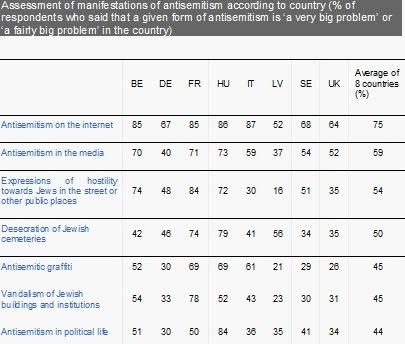Combating antisemitism: more targeted measures needed
Key findings:
*66% of respondents consider antisemitism to be a major problem in their countries, while 76% said the situation had become more acute over the last five years.
*21% of all respondents have experienced an antisemitic incident or incidents involving verbal insult, harassment or a physical attack in the 12 months preceding the survey. 2% of respondents had been victims of an antisemitic physical attack over the previous year.
*Under-reporting: 76% of victims of antisemitic harassment did not report the most serious incident to the police or any other organisation.
*Under-recording: limited data-collection mechanisms in many EU Member States mean that antisemitic attacks remain under-recorded.
*Antisemitism is considered the fourth most-pressing social or political issue across the countries surveyed, below unemployment, the state of the economy, and concerns about government corruption (see Table 1 in report).
*Three-quarters of respondents consider online antisemitism to be a problem (see table below).
The survey also showed significant differences between countries, which frequently demonstrates their differing histories and traditions, and also patterns of immigration in recent decades. For example,
*In the UK, 9% of respondents said they had often heard the statement “Jews are responsible for the current economic crisis,” while this figure rose to 59% for Hungary.
*The survey found that while in Latvia only 8% of survey respondents said the Israeli-Arab conflict had a large impact on how safe they felt, the figure rose to 28% for Germany and was as high as 73% in France.
In response to the findings of the survey, FRA has formulated a number of suggestions for decision makers, including:
*EU Member States need to record Jewish people’s experiences of fundamental rights violations effectively and comprehensively.
*Public figures should publically condemn antisemitic statements.
*The EU and its Member States must work urgently to find effective ways of combating the growing phenomenon of online antisemitism, for example exploring the option of establishing specialised police units that monitor and investigate hate crime on the internet, as well as encouraging reporting of antisemitic web content to the police.
Background: hate crime
Antisemitic attacks are a form of hate crime. Today’s survey report is published together with FRA's annual antisemitism overview, which brings together statistical data on antisemitic incidents collected by governmental and non-governmental sources. Together, the two reports complement the Agency’s considerable body of work on hate crime. This includes data on the experiences of groups such as lesbian, gays, bisexual and transgender people, Roma and other ethnic minorities. FRA’s annual Fundamental Rights Conference, in Vilnius on 12-13 November 2013, will focus on hate crime.
The reports below, the online data visualisation (where results for each country can be seen), media memo, methodology Q&A, videos and victims’ quotes can be found in the press pack online.
*Discrimination and Hate Crime against Jews in EU Member States: Experiences and Perceptions of Antisemitism
*Antisemitism: Summary overview of the situation in the EU 2001–2012
For further information please contact:
media@fra.europa.eu
Tel.: +43 1 580 30 642Call: +43 1 580 30 642
Sourse:


